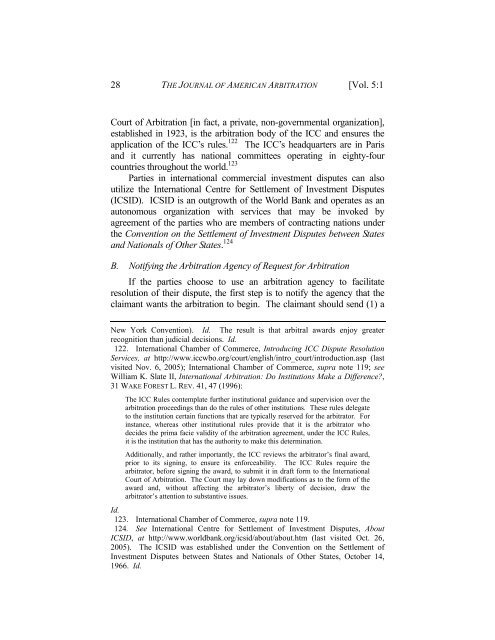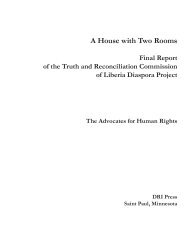2006/Vol. 5 No.1 - Hamline Law - Hamline University
2006/Vol. 5 No.1 - Hamline Law - Hamline University
2006/Vol. 5 No.1 - Hamline Law - Hamline University
You also want an ePaper? Increase the reach of your titles
YUMPU automatically turns print PDFs into web optimized ePapers that Google loves.
28 THE JOURNAL OF AMERICAN ARBITRATION [<strong>Vol</strong>. 5:1<br />
Court of Arbitration [in fact, a private, non-governmental organization],<br />
established in 1923, is the arbitration body of the ICC and ensures the<br />
application of the ICC’s rules. 122 The ICC’s headquarters are in Paris<br />
and it currently has national committees operating in eighty-four<br />
countries throughout the world. 123<br />
Parties in international commercial investment disputes can also<br />
utilize the International Centre for Settlement of Investment Disputes<br />
(ICSID). ICSID is an outgrowth of the World Bank and operates as an<br />
autonomous organization with services that may be invoked by<br />
agreement of the parties who are members of contracting nations under<br />
the Convention on the Settlement of Investment Disputes between States<br />
and Nationals of Other States. 124<br />
B. Notifying the Arbitration Agency of Request for Arbitration<br />
If the parties choose to use an arbitration agency to facilitate<br />
resolution of their dispute, the first step is to notify the agency that the<br />
claimant wants the arbitration to begin. The claimant should send (1) a<br />
New York Convention). Id. The result is that arbitral awards enjoy greater<br />
recognition than judicial decisions. Id.<br />
122. International Chamber of Commerce, Introducing ICC Dispute Resolution<br />
Services, at http://www.iccwbo.org/court/english/intro_court/introduction.asp (last<br />
visited Nov. 6, 2005); International Chamber of Commerce, supra note 119; see<br />
William K. Slate II, International Arbitration: Do Institutions Make a Difference?,<br />
31 WAKE FOREST L. REV. 41, 47 (1996):<br />
The ICC Rules contemplate further institutional guidance and supervision over the<br />
arbitration proceedings than do the rules of other institutions. These rules delegate<br />
to the institution certain functions that are typically reserved for the arbitrator. For<br />
instance, whereas other institutional rules provide that it is the arbitrator who<br />
decides the prima facie validity of the arbitration agreement, under the ICC Rules,<br />
it is the institution that has the authority to make this determination.<br />
Additionally, and rather importantly, the ICC reviews the arbitrator’s final award,<br />
prior to its signing, to ensure its enforceability. The ICC Rules require the<br />
arbitrator, before signing the award, to submit it in draft form to the International<br />
Court of Arbitration. The Court may lay down modifications as to the form of the<br />
award and, without affecting the arbitrator’s liberty of decision, draw the<br />
arbitrator’s attention to substantive issues.<br />
Id.<br />
123. International Chamber of Commerce, supra note 119.<br />
124. See International Centre for Settlement of Investment Disputes, About<br />
ICSID, at http://www.worldbank.org/icsid/about/about.htm (last visited Oct. 26,<br />
2005). The ICSID was established under the Convention on the Settlement of<br />
Investment Disputes between States and Nationals of Other States, October 14,<br />
1966. Id.
















